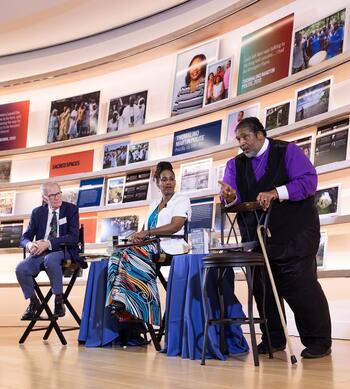Around 100 Yale alums, donors, and guests packed an event space at the new International African American Museum in Charleston, S.C., on September 14 to hear two Yale scholars extol the value of honest reckonings with history, even its most painful living legacies.
 In a time when areas of the country are shutting down examinations of slavery and racism, David Blight, Pulitzer Prize-winning Yale history professor, and William Barber, Director of the Center for Public Theology and Public Policy at YDS, exchanged unsparing insights on the evils of oppression and the necessary work of confronting them.
In a time when areas of the country are shutting down examinations of slavery and racism, David Blight, Pulitzer Prize-winning Yale history professor, and William Barber, Director of the Center for Public Theology and Public Policy at YDS, exchanged unsparing insights on the evils of oppression and the necessary work of confronting them.
‘Reckoning: Learning from the Past to Transform the Future’: Watch the event video
Propped on a table between Blight and moderator Tonya Matthews (IAAM President and CEO) was a copy of Yale and Slavery, authored by Blight and a research team that included YDS alum Michael Morand ’93 M.Div. This definitive history of Yale’s historical entanglement with slavery was released in February as a culmination of a research project to document and understand the roles of slavery and enslaved people in Yale’s history and development.
“This history—we’ve got to learn from it and act on it,” Barber declared. “… Every time this kind of truth comes out, it lets me know a reckoning is coming. I don’t mean a violent reckoning. I mean we are going to come a point (in society) where the weight of the injustices and divisions are too heavy to continue to exist. And we’re going to have to do what God told Joseph to do: choose this day—this day—to restore, repair, and revive.”
The museum opened last year on the site of Gadsden’s Wharf, the disembarkation point for tens of thousands of enslaved Africans brought to America from the late 1760s through 1808. Helping lead the museum through much of its development was YDS alum Elijah Heyward ’07 M.A.R., who at the time was its Chief Operating Officer. Heyward, a member of the YDS Dean’s Advisory Council, attended Saturday’s event, along with several other DAC members and YDS alums and numerous Yale graduates.
 In the question-and-answer session, Blight spoke about the poignancy of Charleston as a site where the human spirit has shown up in its best and worst forms. He recalled sharing a speakers platform with the Rev. Clementa Pinckney at an uplifting commemorative event in the city in 2015—two months before the mass shooting at Pinckney’s church. A shooter motivated by racial animus murdered Pinckney, Pastor of Emanuel A.M.E. Church, and eight parishioners.
In the question-and-answer session, Blight spoke about the poignancy of Charleston as a site where the human spirit has shown up in its best and worst forms. He recalled sharing a speakers platform with the Rev. Clementa Pinckney at an uplifting commemorative event in the city in 2015—two months before the mass shooting at Pinckney’s church. A shooter motivated by racial animus murdered Pinckney, Pastor of Emanuel A.M.E. Church, and eight parishioners.
Charleston is also where the first shots of the Civil War were fired—an event memorialized by an exhibit at the Fort Sumter National Monument visitors center, located adjacent to the IAAM.
“This town,” Blight said, “has a beautiful, powerful, and terrible place in American history, and all of that has to be told.”
YDS Dean Greg Sterling welcomed the audience by voicing appreciation for their willingness to engage what can be a difficult subject. “Your presence indicates you have a commitment to addressing one of the great problems we face in our society,” Sterling said. “(At YDS) we view it not just as a political and social issue but as a moral issue. And that’s why we as a divinity school are so committed to addressing the legacy of slavery and the problems of racism that undergird it.”
“It wouldn’t be enough to simply talk about what’s happened in the past,” Sterling said. “It needs to transform us in the present and shape our future.”